SWEDISH
SOUTH ASIAN STUDIES NETWORK
Newsletter 70:
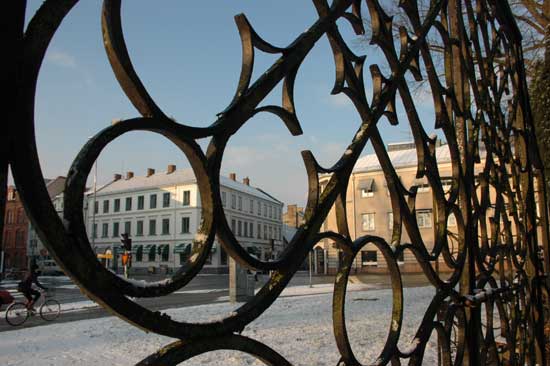 9
February
2007
9
February
2007
| SASNET News | Educational News |
| Research Community News | |
| Conferences and workshops | Important lectures and seminars |
| Cultural activities | Politics and Business |
| New items on the web site | |
• Consolidation the keyword
SASNET’s
new board had its first meeting in Lund on Monday 29 January 2007.
For the coming year, the board decided that the main priority should
be to consolidate and strengthen SASNET’s network in Sweden, but
the board also approved that a contact journey to India should be carried
out by the Director and Deputy Director in the Fall 2007. Another decision
was taken regarding new members to the reference group for the evaluation
of proposals for SASNET’s planning, workshop and guest lecture
programme grants. The board decided to appoint Arild Engelsen Ruud,
Institute for Cultural Studies and Oriental Languages, University of
Oslo; Ewa Wäckelgård,
International Science Programme (ISP), Uppsala University; and Jytte
Agergaard Larsen, Department of Geography, University of Copenhagen,
as members of this group. Read the verified
minutes from the meeting (as a pdf-file).
• Applications for the next round of SASNET
planning grants
Applications for SASNET’s planning, workshop and guest lecture
programme grants 2007 are now invited. Closing date for applications
is 15 June 2007. More information.
• Public seminars and lectures in collaboration
with Lund University
In collaboration with the Centre
for East and South-East Asian Studies (ACE), SASNET organises
a series a public lectures and seminars during the Spring 2007.
The lectures will also be attended by the Lund University Masters
students in Asian Studies, as part of their training. See
the poster for the public lectures/seminars series.
On Thursday 15 March, 13–15, a seminar will be held with Dr. Muhammad
Rab from Bangladesh. He will lecture about ”Community Management
of Fisheries in Bangladesh”. Venue: Java Hall, Alfa 1, Ground Floor,
Scheelevägen 15 A, Lund.
On Monday 26 March 2007, 13–15, Ravinder Kaur,
Post-doctoral Fellow, Roskilde University, will give a lecture about ”Islam
between East and West – the political situation in Pakistan and Afghanistan”.
Venue: Department of Sociology, Paradisgatan 5, House G, Ground floor Hall 3,
Lund.
On Tuesday 3 April 2007, 09–11, Dr. Camilla Orjuela,
Researcher at the Dept. of Peace and Development Studies,
School of Global Studies, Göteborg University, will lecture about ”Ethnicity
and Violent Conflict in Sri Lanka”. Venue: Java Hall, Alfa 1, Ground
Floor, Scheelevägen 15 A, Lund.
On Tuesday 17 April, 09–11, Neil Webster, Senior
researcher at Development Studies, Danish Institute of International Studies
(DIIS), Copenhagen, will lecture about ”Nepal: Kingdom versus Maoism”.
Venue: Java Hall, Alfa 1, Ground Floor, Scheelevägen 15 A, Lund.
• More information about SASNET and its
activities
See SASNET’s page, http://www.sasnet.lu.se/sasnet.html
• Panels suggestions invited for the
20th ECMSAS conference
 Panels
suggestions are now invited for the 20th European Conference on Modern
South Asian Studies (ECMSAS), to be held in Manchester, UK, 8–11
July 2008. The ECMSAS is the largest gathering of South Asia oriented researchers
in Europe, covering all fields from the humanities and social sciences
to technology, natural sciences and medicine. The conference is held biannually
under the aegis of the European Association of South Asian Studies (EASAS),
a professional, non-profit organisation of scholars engaged in research
and teaching concerning South Asia with regard to all periods and fields
of study. SASNET organised the 18th ECMSAS conference in Lund in 2004 (more
information about the Lund conference), and in June 2006, the 19th
ECMSAS conference was arranged in Leiden, the Netherlands (read
SASNET’s report from the Leiden conference). Suggestions for
panels at the 2008 conference are now actively considered. The conference
will be hosted by the School of Arts, Histories and Cultures at the University
of Manchester, and draws on the vibrant South Asian Studies programmes
in Humanities and Social Sciences at the University. Go
to the conference web site.
Panels
suggestions are now invited for the 20th European Conference on Modern
South Asian Studies (ECMSAS), to be held in Manchester, UK, 8–11
July 2008. The ECMSAS is the largest gathering of South Asia oriented researchers
in Europe, covering all fields from the humanities and social sciences
to technology, natural sciences and medicine. The conference is held biannually
under the aegis of the European Association of South Asian Studies (EASAS),
a professional, non-profit organisation of scholars engaged in research
and teaching concerning South Asia with regard to all periods and fields
of study. SASNET organised the 18th ECMSAS conference in Lund in 2004 (more
information about the Lund conference), and in June 2006, the 19th
ECMSAS conference was arranged in Leiden, the Netherlands (read
SASNET’s report from the Leiden conference). Suggestions for
panels at the 2008 conference are now actively considered. The conference
will be hosted by the School of Arts, Histories and Cultures at the University
of Manchester, and draws on the vibrant South Asian Studies programmes
in Humanities and Social Sciences at the University. Go
to the conference web site.
• Licentiate thesis about Nutritional
Status Among Elderly People in Bangladesh
Tamanna Ferdous
from the Division
of Geriatric Epidemiology; Department of Neurobiology, Caring
Sciences and Society (NVS); Karolinska Institutet Medical
University, Stockholm defended a Licentiate thesis titled ”Prevalence
of Malnutrition and Determinants of Nutritional Status Among Elderly
People: A Population-Based Study in Rural Bangladesh” on
Wednesday 31 January 2007. This study reports a high prevalence
of malnutrition among elderly people in rural Bangladesh. In order
to reduce the proportion of the undernourished worldwide, it is important
to address this subset of the population. This research also shows
that malnutrition is associated with both disease and non-disease
related factors. Venue: Aging Research Center, Gävlegatan 16,
Stockholm. More information.
• Uppsala dissertation about the Balochi
Language in Turkmenistan
Serge Axenov, Iranian
Languages, Section for Asian and African Languages and Cultures,
Department of Linguistics and Philology, Uppsala University, defended
his doctoral dissertation about ”The Balochi Language
of Turkmenistan: A corpus-based grammatical description” on
Friday 19 January 2007. Faculty opponent was Dr. Elena Bashir, University
of Michigan, Chicago, USA. More
information with abstract.
• World
Bank resources on India related research
 In
connection with the World Economic Forum in Davos, Switzerland, held 24–28
January 2007, the World Bank prepared a special section online with useful
information about its India related research. As the theme of the 2007
World Economic Forum has been "The
Shifting Power Equation", focusing on how emerging economies
are increasingly becoming bigger players in the world arena, India
figures prominently in several of the discussions. The web page titled ”India
at Davos: Resources from the World Bank” includes information about
several research fields, ssuch as:
• Economics: New Drivers;
• Business: Leading in a Connected World;
• Managing India's Youthful Tide;
• The City: Managing Rapid Urbanization in Developing Economies;
• Empowering Individuals. Go
to the web page.
In
connection with the World Economic Forum in Davos, Switzerland, held 24–28
January 2007, the World Bank prepared a special section online with useful
information about its India related research. As the theme of the 2007
World Economic Forum has been "The
Shifting Power Equation", focusing on how emerging economies
are increasingly becoming bigger players in the world arena, India
figures prominently in several of the discussions. The web page titled ”India
at Davos: Resources from the World Bank” includes information about
several research fields, ssuch as:
• Economics: New Drivers;
• Business: Leading in a Connected World;
• Managing India's Youthful Tide;
• The City: Managing Rapid Urbanization in Developing Economies;
• Empowering Individuals. Go
to the web page.
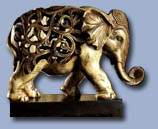 • Swedish
consultancy agency specialised
on legal issues in the South Asian
region
• Swedish
consultancy agency specialised
on legal issues in the South Asian
region
South Asia Experts – Sweden is a new consultancy agency
specialised in various legal and socio-economic aspects concerning
the South Asian region. SAE-S, based in Stockholm, assists
companies and businesses, NGOs, and educational institutes in Human
Rights, Child Rights, Corporate Social Responsibility, Labour laws
and standards, Competition Law, Intellectual Property Rights, and other
similar aspects related to India, Bangladesh, Sri Lanka, Nepal and
Pakistan. It has been launched by Parul
Sharma, a human rights lawyer specialised on the legal systems
and cultures of South Asia (more information
about Parul Sharma). She
has written a doctoral thesis about child rights, with India as a case
study, now being in the final evaluation at the National Law School
of India University (NLS) in Bangalore, India.
• Oxford
Centre for Hindu Studies offers free recordings
of lectures and seminars
 The Oxford Centre for Hindu Studies (OCHS)
at the University of Oxford has now officially unveiled a unique Online
Library of over 100 MP3 recordings of lectures and seminars. Anyone with a computer
and an internet connection now has free access to the best of Oxford's
teaching about Hindu Culture. The themes vary from Female Yoginis to
Christian Ashrams, from Hindu Psychology to the history of NRIs. The
OCHS is committed to the idea that academic insights are meant for
everyone. The Online Lecture Library is another step in the effort
to develop the field of Hindu Studies by sharing the insights of leading
professionals in the field who have visited OCHS over the years. Stretching
from 2003 to the present and growing with each new term, the library
ranges from introductory surveys of major Hindu themes, texts and traditions;
single lectures on topics like Women in the Mahabharata or Poetry in
the Vedas; discussions with Jewish, Muslim, and Christian Scholars,
and seminars on Hindi Cinema. Listen to Sir Mark Tully talk about the
importance of India's 'Middle Way' approach to cultural tolerance or
hear a whole lecture given in Sanskrit. More
information, with links to upload OCHS’ lectures and seminars.
The Oxford Centre for Hindu Studies (OCHS)
at the University of Oxford has now officially unveiled a unique Online
Library of over 100 MP3 recordings of lectures and seminars. Anyone with a computer
and an internet connection now has free access to the best of Oxford's
teaching about Hindu Culture. The themes vary from Female Yoginis to
Christian Ashrams, from Hindu Psychology to the history of NRIs. The
OCHS is committed to the idea that academic insights are meant for
everyone. The Online Lecture Library is another step in the effort
to develop the field of Hindu Studies by sharing the insights of leading
professionals in the field who have visited OCHS over the years. Stretching
from 2003 to the present and growing with each new term, the library
ranges from introductory surveys of major Hindu themes, texts and traditions;
single lectures on topics like Women in the Mahabharata or Poetry in
the Vedas; discussions with Jewish, Muslim, and Christian Scholars,
and seminars on Hindi Cinema. Listen to Sir Mark Tully talk about the
importance of India's 'Middle Way' approach to cultural tolerance or
hear a whole lecture given in Sanskrit. More
information, with links to upload OCHS’ lectures and seminars.
• Research papers from Queen Elisabeth House
Working Papers Series distributed free of charge
In order to stimulate discussion
among the worldwide community of scholars,
the Queen Elizabeth House Working Papers (University
of Oxford) are distributed free of charge via Internet. Recent papers
in the Series related to South Asia include "Commercialisation,
Commodification And Gender Relations In Post Harvest Systems For
Rice In South Asia”
by Prof Barbara Harriss-White, and ”Religious
Schools, Social Values and Economic Attitudes: Evidence from Bangladesh”
by Mohammad Niaz Asadullah (Reading University) and Nazmul Chaudhury
(World Bank).
• South Asia
contributions to 10-year project on World Literature History
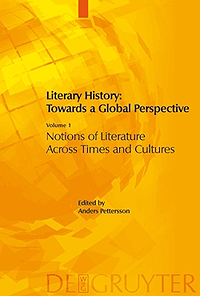 An ambitious
multidisciplinary Swedish research project on ”Literary
History: Towards a Global Perspective” was completed in 2006.
The aim of the project, initiated in 1996 and launched in 1999 with
funding from the Swedish Research Council, was to find suitable methods
and approaches for studying and analysing literature globally, emphasizing
the comparative and intercultural aspect. It has involved specialists
from a large number of disciplines, primarily from the fields of comparative
literature, Oriental studies and African studies in Sweden, headed
by Gunilla Lindberg-Wada, Professor of Japanese Studies, Dept. of Oriental
Languages, Stockholm University.
An ambitious
multidisciplinary Swedish research project on ”Literary
History: Towards a Global Perspective” was completed in 2006.
The aim of the project, initiated in 1996 and launched in 1999 with
funding from the Swedish Research Council, was to find suitable methods
and approaches for studying and analysing literature globally, emphasizing
the comparative and intercultural aspect. It has involved specialists
from a large number of disciplines, primarily from the fields of comparative
literature, Oriental studies and African studies in Sweden, headed
by Gunilla Lindberg-Wada, Professor of Japanese Studies, Dept. of Oriental
Languages, Stockholm University.
The
project has now resulted in a set of four volumes being published
by Walter de Gruyter in Berlin & New York. Each volume is
devoted to a special research topic. Volume 1 deals with ”Notions
of Literature Across Cultures”, and here Gunilla
Gren-Eklund, Professor Emeritus of Indology, especially Sanskrit, Dept.
of Linguistics and Philology, Uppsala University, has contributed
with an article about ”Traditional Indian learning – text,
language and poetics”. In Volume 2 about ”Literary
Genres: An Intercultural Approach”, Associate Professor
Christina Nygren, Dept. of Theatre studies,
Stockholm University, writes about ”Drama for learning
and pleasure: Japan, China and India in a comparative perspective”.
Volumes 3+4 deal with ”Literary Interactions
in the Modern World”. Professor Margareta Petersson, Dept.
of Comparative Literature, Växjö University, and
an expert on Indian English literature of the 19th and 20th centuries,
was the Editor of Volume 3:1, in which she has written an introductory
text about ”Encounters between literary cultures in
the 19th and 20th centuries”. Finally, Dr. Christina
Nygren again contributes to Volume 3:2, with an article about ”Appropriations
of European theatre in Japan, China and India”. More
information about the Walter de Gruyter publication.
• European Parliament
adopted resolution on the human rights situation of Dalits in India
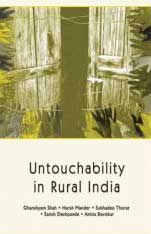 On
Thursday 1 February 2007, the European Parliament adopted a resolution
on the human rights situation of Dalits in India. The resolution
came under a special procedure whereby it was passed without voting,
and with only a few dissenting voices by MEPs.
The resolution was first passed by the parliament’s Development
Committee in December 2006, following a hearing where Ruth Manorama,
President of the National Federation of Dalit Women (NFDW) and winner
of the Right Livelihood Award 2006, spoke, and also representatives of
the Government of India.
On
Thursday 1 February 2007, the European Parliament adopted a resolution
on the human rights situation of Dalits in India. The resolution
came under a special procedure whereby it was passed without voting,
and with only a few dissenting voices by MEPs.
The resolution was first passed by the parliament’s Development
Committee in December 2006, following a hearing where Ruth Manorama,
President of the National Federation of Dalit Women (NFDW) and winner
of the Right Livelihood Award 2006, spoke, and also representatives of
the Government of India.
The
resolution applauds efforts taken by the Indian government to
protect and promote the rights of Dalits, concerning at least
167 million people, including the provisions on the abolition
of the practice of untouchability, the prohibition of discrimination
on grounds of caste, and political affirmative action through
reservations in State-run institutions and political representative
bodies; but the resolution is equally concerned about the violence
and atrocities being committed on a daily basis against Dalits
in India. The resolution quotes a recent study on untouchability
in rural India (Shah,
Mander, Thorat, Deshpande and Baviskar: ”Untouchability
in Rural India”; Sage Publications, India, 2006), covering
565 villages in 11 States, showing that a large proportion of
public health workers refuse to visit Dalit homes, Dalits are
prevented from entering police stations, and Dalits are denied
access to water sources in 48 % of the villages studied because
of segregation and untouchability practices.
The resolution now urges the European Commission to raise the issue of
caste-based discrimination during the EU-India Summits and other meetings
as part of all political, human rights, civil society, development and
trade dialogues. It also instructs that the resolution should be forwarded
to the governments of the Member States, the President, the Government
and Parliament of India, the UN Secretary-General, and the heads of the
UN Sub-Commission on the Promotion and Protection of Human Rights, the
International Labour Organization, the UNICEF, the World Bank and the
International Monetary Fund. Read
the full text of the resolution adopted by the European Parliament.
• Noragric announces post of Head of
Department
The Norwegian University
of Life Sciences (UMB) calls for applications for the post of Head
of Department at Noragric (Department
of International Environment & Development Studies). Noragric,
the youngest and fastest growing department at UMB, has a unique academic
and working environment due to its international and interdisciplinary
character. The academic staff come from social and natural sciences
and from the global North and the South. The closing date for applications
is 12 February 2007. The position will fall vacant in November 2007
when the term of the incumbent Head ends. However, the date of assumption
of duties by the new Head is negotiable. Read
the official announcement.
More information about the position.
• Afghanistan
Research and Evaluation Unit announces positions for researchers
 The
Afghanistan Research and Evaluation Unit, AREU, invites applications
for a position as Rural Livelihoods Researcher, based in Kabul.
He/she will be responsible for developing and implementing research
in the Rural Livelihoods Programme. The Researcher will manage staff
responsible for research activities under the Programme, as well as
potentially other staff who may work intermittently on Livelihoods
issues.
AREU also invites applications for a vacancy as Economics Researcher,
responsible for developing and implementing research in Political Economy
as one of the main themes in AREU’s research profile. Other current
AREU announcements are for a Communications Internship for the Summer
2007, to participate in the editing of AREU’s flagship publication,
The A to Z Guide to Afghanistan Assistance; and an Internship for the
Gender research programme. Go
for AREU’s announcement page.
The
Afghanistan Research and Evaluation Unit, AREU, invites applications
for a position as Rural Livelihoods Researcher, based in Kabul.
He/she will be responsible for developing and implementing research
in the Rural Livelihoods Programme. The Researcher will manage staff
responsible for research activities under the Programme, as well as
potentially other staff who may work intermittently on Livelihoods
issues.
AREU also invites applications for a vacancy as Economics Researcher,
responsible for developing and implementing research in Political Economy
as one of the main themes in AREU’s research profile. Other current
AREU announcements are for a Communications Internship for the Summer
2007, to participate in the editing of AREU’s flagship publication,
The A to Z Guide to Afghanistan Assistance; and an Internship for the
Gender research programme. Go
for AREU’s announcement page.
• ENCARI
network invites data from European academics working on India related
research
 The
European Network on Contemporary Academic Research on India (ENCARI) is
now building up an extensive database of European academics working
on various fields related to India. Individual
researchers, as well as research groups/universities/institutions
are invited to join the network. However, please note that you can
only join the network if you are based in one of the EU member states.
The aim of the network is to foster closer cooperation between European
research institutions and researchers within the field of contemporary
India studies. It also aims to strengthen the ties between the European
Union (EU) and India, promote funding for specific types of India-focused
research within the field of contemporary social science (something
that finally might result in the setting up of a European Centre
for Indian Studies), and provide an opportunity and forum for India
experts within Europe to pool and exchange information and resources
with each other and EU policy-making officials.
The
European Network on Contemporary Academic Research on India (ENCARI) is
now building up an extensive database of European academics working
on various fields related to India. Individual
researchers, as well as research groups/universities/institutions
are invited to join the network. However, please note that you can
only join the network if you are based in one of the EU member states.
The aim of the network is to foster closer cooperation between European
research institutions and researchers within the field of contemporary
India studies. It also aims to strengthen the ties between the European
Union (EU) and India, promote funding for specific types of India-focused
research within the field of contemporary social science (something
that finally might result in the setting up of a European Centre
for Indian Studies), and provide an opportunity and forum for India
experts within Europe to pool and exchange information and resources
with each other and EU policy-making officials.
ENCARI
was formally launched as an European Commission initiative,
under the name ANERI (Academic Network for European Research
related to India), during the 19th European Conference
for Modern South Asian Studies held in Leiden in June 2006.
The project was prepared by a team consisting of Dr Willem
van der Geest, European Institute for Asian Studies (EIAS)
in Brussels (team leader), Dr Kunal Sen, University of East
Anglia, UK (as economic analyst), and Dr Lawrence Saez, London
School of Economics, UK (as political analyst). During the
Spring 2006 they visited institutions and met researchers all
over Europe in order to work out a strategy for the network.
On Wednesday 3 May 2006 Dr. Kunal Sen came to Lund for a fruitful
meeting with SASNET’s Staffan
Lindberg and Lars Eklund. Together they discussed the role
SASNET and Swedish researchers could possibly play in the further
development of the network. SASNET is now a member institution
of ENCARI. More
details about the project.
• Room for rent in Delhi for Swedish
researcher
A Swedish researcher interested to rent a room in New Delhi,
India during 2007 may contact Jan
and Rajya Sjunnesson Rao. The room is located in New Delhi residential
suburb Vasant Kunj close to Jawaharlal Nehru University, JNU.
• More information about South Asia related
research at Swedish and Nordic universities
See SASNET’s page, http://www.sasnet.lu.se/research.html
• Six weeks Tamil language
summer school in Puducherry
The Puducherry
(Pondicherry) Institute of Linguistics and Culture (PILC) invites
to its intensive six-weeks Tamil Summer School 2007. It
will be organised from 16 July
– 25 August 2007. The Tamil Summer School was initiated
in 1998 by the Department of Social Sciences, French Institute,
Puducherry to offer training to language researchers in Humanities
and Social sciences. PILC has been organising this course since
2004. The medium of teaching is English as well as Tamil. The
TSS focuses on Spoken Tamil rather than on the classical and
written forms being taught in European Universities. Two levels
of spoken Tamil courses are offered: Basic and Intermediate. More
information (as a pdf-file).
• Nordic Centre in India
organises summer course in Hyderabad for the fifth time
For the fifth
time the course 'Contemporary India' will be held in the Summer 2007
at the University of Hyderabad,
in collaboration with the Nordic Centre in India. The course, running
1 –28 July 2007, is tailor-made for Nordic students and introduces
issues of politics, culture and economy. It consists of the following
five parts: • Introductory course: The diversity of India:
• The political system and questions of identity: •
Globalisation and the economy focusing on the city of Hyderabad:
• Development, environment and human rights: and • Indian
literature and cinema. The students coming from most Nordic countries
(and universities that are members of the Nordic Centre in India) are
given board and lodging in an excellent guest house. Apply directly to
NCI before 1 April 2007. Each member university can nominate 3 candidates
and 3 reserves on this course. More
information.
• NCI summer course in
Bangalore on contemporary environmental issues in India
NCI organises, in collaboration
with the Institute for Social and Economic Change (ISEC) in Bangalore,
a four-weeks course for graduate and post-graduate students from the Nordic
countries, titled “Approaching the Environment in India” 23
July–23 August 2007. It is a multi-disciplinary course that seeks
to introduce students to recent theories and methods in the study of
contemporary environmental issues in India. Apply directly to NCI before
1 April 2007. Each member university can nominate 3 candidates and
3 reserves on this course. More
information.
• NCI summer course in
Mumbai on Demography, Gender and Reproductive
Health
NCI also invites applications for a a five
week intensive course in Mumbai on “Demography, Gender and Reproductive
Health”, 8 July–4 August 2007. It is an an introduction
to population studies in India, organised by the International Institute
for Population Science (IIPS) in Mumbai in collaboration with NCI.
The course is a multi-disciplinary course that is open for under-graduate
and graduate students from the Nordic countries. Apply directly to
NCI before 1 April 2007. Each member university can nominate 3 candidates
and 3 reserves on this course. More
information
•
Sida funded English-language educational training
programmes at Lund University
![]() Lund University Education – the university's
company for commissioned education – offers a number of English-language
educational training programmes funded by the Swedish International Development
Cooperation Agency, Sida, to
be held in the Fall 2007 – Spring 2008.
Lund University Education – the university's
company for commissioned education – offers a number of English-language
educational training programmes funded by the Swedish International Development
Cooperation Agency, Sida, to
be held in the Fall 2007 – Spring 2008.
– A training programme on ”Urban Transport” for professionals in the field. From South Asia, persons from Bangladesh, Bhutan, India, Nepal and Sri Lanka are welcome to apply for this programme. Closing date for applications: 2 April 2007. More information.
– A training programme on ”Child rights, Classroom and School Management”. It consists of two phases: The first phase consists of 3 weeks in Sweden with studies in the subject area. This should be combined with a project work on a part-time basis during 5 months on a relevant task in the home country. The second phase consists of a follow-up seminar of the project work during 2 weeks in India, during this phase the participants will be asked as a part of the course to develop, discuss and present plans for applying the course content in their work. Finally, a couple of months after the second phase, a follow-up visit will be conducted by the mentor to the participants’ home countries. From South Asia, persons working with pedagogical support and pedagogical development in Afghanistan, Bangladesh, Bhutan, India, and Sri Lanka are welcome to apply for this programme. Closing date for applications: 30 April 2007. More information.
– A training programme on ”Sustainable Urban Water and Sanitation”. The overall objective of the programme is to provide the participants with understanding and knowledge about the need for integrated approaches and the organisational and institutional changes that are necessary for a sustainable provision of water supply and sanitation services in urban areas. From South Asia, professionals in the field from Bangladesh, India and Sri Lanka are welcome to apply for this programme. Closing date for applications: 30 April 2007. More information.
– A training programme on ”Sexual and Reproductive Health and Rights – SRHR” runs during the Spring and Fall 2007. The target group is persons working with SRHR, in managing position and that have responsibility to develop capacity and knowledge within SRHR. Participants should have a background as midwives/teachers in the health care sector or gynaecologists/obstetricians. From South Asia, persons from Bangladesh, Bhutan, India, Nepal and Sri Lanka have been accepted for this programme. Closing date for applications was 1 November 2006. More information.The Dept. of Housing Development and Management at Lund University has already, since several years, organised the same kind of International trianing courses with funds from Sida. Their short courses have been directed to planners, architects, civil engineers, administrators and others working with construction, housing and human settlements. A postgraduate training course on ”Conservation and Management of Historic Buildings” was held in the Fall 2006, in collaboration with the Department of Architectural Conservation and Restoration, Lund University. The first three-weeks part was held in Lund, and the course then continues with a two-weeks tour to Asia or Africa in the spring 2007. More information.
•
Inderjit Khurana finalist for the
2007 World’s Children’s Prize for the Rights of the Child
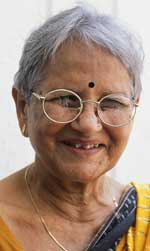 Ms.
Inderjit Khurana from India is one of the three finalists for the
2007 World’s Children’s Prize for the Rights of the Child
(WCPRC), with prize money totalling SEK 1 million. Khurana
(photo by Kim Naylor) works for the organisation Ruchika
School Social Service Organization (RSSO), Bhubaneswar, India.
She has run over a hundred schools and two phone help lines for 21
years, helping the poorest, most vulnerable children who live and
work on train platforms. The
WCPRC, founded by the Swedish organisation Children’s World,
empowers children and young people all over the world so that they
can make their voices heard and demand respect for their rights in
accordance with the UN Child Convention. It has quickly grown into
the world's largest annual educational initiative for children on
rights and democracy. 11 million students at 20,000 schools in 82
countries participate in the WCPRC, and that number is growing constantly.
Around five million of those children will participate in a Global
Vote to determine who will receive the Global Friends’ Award
2007. This year’s prize ceremony will be held on 16 April at
Gripsholm Castle in Mariefred, where HM Queen Silvia will help the
children to give out the prizes. More
information.
Ms.
Inderjit Khurana from India is one of the three finalists for the
2007 World’s Children’s Prize for the Rights of the Child
(WCPRC), with prize money totalling SEK 1 million. Khurana
(photo by Kim Naylor) works for the organisation Ruchika
School Social Service Organization (RSSO), Bhubaneswar, India.
She has run over a hundred schools and two phone help lines for 21
years, helping the poorest, most vulnerable children who live and
work on train platforms. The
WCPRC, founded by the Swedish organisation Children’s World,
empowers children and young people all over the world so that they
can make their voices heard and demand respect for their rights in
accordance with the UN Child Convention. It has quickly grown into
the world's largest annual educational initiative for children on
rights and democracy. 11 million students at 20,000 schools in 82
countries participate in the WCPRC, and that number is growing constantly.
Around five million of those children will participate in a Global
Vote to determine who will receive the Global Friends’ Award
2007. This year’s prize ceremony will be held on 16 April at
Gripsholm Castle in Mariefred, where HM Queen Silvia will help the
children to give out the prizes. More
information.
• More information about South Asia related
education at Swedish and Nordic universities
See SASNET’s page, http://www.sasnet.lu.se/education.html
• South Asian Travelling Seminar on
”Exploring Masculinities” to be held in Delhi
A so-called
South Asian Travelling Seminar titled ”Exploring
Masculinities”, will be held in New Delhi 13–14 February
2007. The seminar is both an academic exercise in generating
interest for further research on masculinities as well as a campaign
to form a network of university communities that are willing to take
up issues of gender equality. The
travelling seminars on masculinities are organised by Aakar, and
as the title suggests, they travel to ten universities across South
Asia. The seminar at each location is held in collaboration with a
university department. In Delhi, the Department of Sociology, University
of Delhi is the co-organiser of the seminar. The speakers include Dr.
Jani De Silva, International Centre For Ethnic Studies, Colombo, Sri
Lanka; Imtiaz Saikh, Department of Women and Gender Studies, University
of Dhaka, Bangladesh; Rubina Khilji, Department of Gender Studies,
University of Peshawar, Pakistan; and Dr. Nivedita Menon, Department
of Political Science, University of Delhi, India. More
information about the South Asian Travelling Seminar (as a pdf-file).
• Kolkata seminar on Media-Governance
Dynamics in 21st Century India
A one-day National Seminar on Restyling
Politics: Media-Governance Dynamics in 21st Century India will be held
in Kolkata, India,
on Saturday 17 February 2007, from 09.30. The workshop is funded by
the University Grants Commission of India, and organised by the Dept.
of Political Science, Calcutta University. The key speakers and panelists
in the seminar include eminent academics, activists and journalists.
The sessions are: "Mass Mediated Reality: Media, State and the
Civic Space", " ‘Mass’ Media and the Public Domain:
Including the Excluded?" and "Mass Mediated Reality: Media,
State and the Civic Space". The panel discussion is titled "Do
the Indian Mainstream Media Suffer from the Illusion of Omnipotence?" Venue:
Calcutta University's Alipore Campus. More information from the seminar
coordinator Dr. Dipankar Sinha.
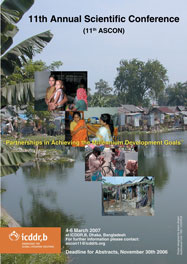 • 11th
Annual Scientific Conference of ICDDR,B to be held
at in Dhaka
• 11th
Annual Scientific Conference of ICDDR,B to be held
at in Dhaka
The 11th Annual Scientific Conference of ICDDR,B
(the 11th ASCON) will be held at the Centre in Dhaka, Bangladesh 4–6
March 2007,
followed by the 40th Anniversary celebrations of the Demographic Surveillance
System (DSS)-Matlab, from 7 to 8 March 2007. The Theme of the Conference
is “Partnership in Achieving the Millennium Development Goals.” Scientists,
health professionals, programme managers, community organizers, and
policy-makers are invited to participate in this forum providing an
opportunity to disseminate and share results of research, experiences,
and lessons learnt from recent research and programmes. The 11th ASCON
will especially concentrate on the Millennium Development Goals (MDG)
No. 1, 4, 5, and 6. Deadline for abstracts has been extended to 30
December 2006. More
information.
• Pondicherry conference about Tamil
Diaspora
An International conference titled ”Facets
of Tamil Diaspora” is held in Pondicherry, India, 14 – 16
March 2007. It will be organized by the Department of Indology, French
Institute of Pondicherry and the Department of Tamil Literature, University
of Madras. The conference aims at exploring and understanding the issues
and problems of the ‘Tamil Experience in Other Spaces’.
Venue: Jawaharlal Nehru Conference Hall, French Institute of Pondicherry,
11, Saint Louis Street, Pondicherry. More
information.
• International Sociology Seminar to
be held in Dhaka
An International seminar on ”Fifty
Years of Sociology, Fifty Years of Social Transformation: Future of
the Past” is held in Dhaka, Bangladesh, 28–30
June 2007. It is organised by the Dept. of Sociology at the University
of Dhaka, in cinnection with its Golden Jubilee celebrations. Papers
are invited from interested participants on growth and development
of sociology as a discipline and its role in social transformation
covering for example: ”Crisis and Future of Sociological Theory”; ”Media
and Post Modern/Post Colonial Society”; ”Globalization,
Identity and Risk”; ”Social Inequality, Social Mobility
and Class Formation”;
”Poverty, Microcredit, and Rural Transformation”; ”Population,
Health, Gender and Reproductive Rights”; and ”Urban
Development, Urban Space and Asian Megalopolis”. Venue: Teacher-Student
Centre (TSC), University of Dhaka. Limited travel assistance may
be provided to South Asian participants. Selected papers will be
published in a special issue of the Bangladesh e-Journal of Sociology. More
information (as a pdf-file).
• Other conferences connected to South Asian
studies arranged all over the World
See SASNET’s page, http://www.sasnet.lu.se/conferences.html#conf
Important lectures and workshops
• Stig Toft Madsen lectures in Oslo
about Musharraf and Pakistani Prospects
Stig Toft Madsen from the Nordic Institute
for Asian Studies (NIAS), Copenhagen, lectures in Oslo on
Monday 12 February 2007, 14.15–16.00. Dr. Toft Madsen will
talk about ”The
Importance of Being Pervez Musharraf: Pakistani Prospects”. In
1972, Herbert Feldman published a book on Pakistan entitled
”From Crisis to Crisis”. Today, too, the country is often
perceived as a parking lot of unresolved contradictions. Whether these
contradictions originated in the very "Idea of Pakistan", emerged
haphazardly contingent upon factors beyond Pakistani political control,
or resulted from political errors, seem central to the situation of Pakistan
today. Through a portrait of President Pervez Musharraf, the seminar
will focus on Pakistan’s re-current crises and their possible resolution.
The seminar is organised by the Asian Network (Nettverk for Asiastudier).
Venue: Centre for Development and Environment (SUM), seminar rom, 4th
floor, Sognsveien 68, Oslo. More
information (as a pdf-file).
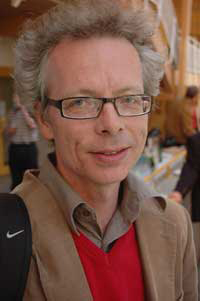 • Per
Ståhlberg presents his project about India as a Global
Superpower
• Per
Ståhlberg presents his project about India as a Global
Superpower
Per
Ståhlberg, Dept. of Social Anthropology, Stockholm University,
will lecture about ”India as a Global Superpower; An Anthropological
Study of Future Visions”
at Södertörn University College in Huddinge, on Thursday
15 February 2007, 13–15. Dr. Ståhlberg (photo to the
right) was recently given a major grant from the Bank of Sweden
Tercentenary Foundation (Stiftelsen Riksbankens jubileumsfond),
for a research project on this topic (more
information about Per and his research). The lecture is organised
as a higher seminar by Södertörn University’s School
of Culture and Communication, which includes departments of Media
and Communication Studies, Art History, Philosophy, Pedagogy, English,
History of Ideas and Archeology and the Centre for Studies in Practical
Knowledge. Venue: Primus, C wing, Main campus in Flemingsberg.
• Oslo
seminar about ”Emerging India? Challenges and Prospects”
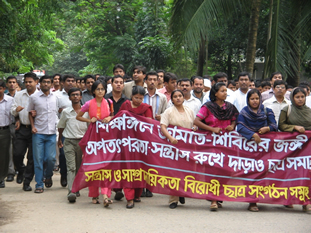 A
one-day seminar about ”Emerging India? Challenges and Prospects” will
be held in oslo on Friday 9 March 2007, 10.30–17.30.
The seminar is organised by the Dept.
of Culture Studies and Oriental Language (IKOS), Oslo University,
as part of its ongoing research project about ’Political
culture in South Asia’. The seminar will focus on the
preconditions for India’s economic growth; its effects on social
and cultural change, as well as on the environment; and which challenges
the state will face in order to secure continued growth. Among the
lecturers are SASNET’s Director Prof. Staffan Lindberg, who will
talk about 25 years of rural change in Tamil Nadu; Prof. Pamela Price,
University of Oslo, about voters preferences, poverty and development;
Sten Widmalm, Uppsala University, about decentralization and development;
Alf Gunvald Nilsen, Univerity of Nottingham, UK, about social movements
and "the reinvention of India". Prof. Hans Blomkvist, Uppsala
University, will talk about the challenges that India faces regarding
energy security and energy supply; Sirpa Tenhunen, University of Helsinki,
about the use of mobile phones in West Bengal; Anne Waldrop, Oslo University
College, about women and political mobilisation; and finally Arild
Engelsen Ruud, University of Oslo, about India’s problematic
relations to its neighbouring countries. More
information.
A
one-day seminar about ”Emerging India? Challenges and Prospects” will
be held in oslo on Friday 9 March 2007, 10.30–17.30.
The seminar is organised by the Dept.
of Culture Studies and Oriental Language (IKOS), Oslo University,
as part of its ongoing research project about ’Political
culture in South Asia’. The seminar will focus on the
preconditions for India’s economic growth; its effects on social
and cultural change, as well as on the environment; and which challenges
the state will face in order to secure continued growth. Among the
lecturers are SASNET’s Director Prof. Staffan Lindberg, who will
talk about 25 years of rural change in Tamil Nadu; Prof. Pamela Price,
University of Oslo, about voters preferences, poverty and development;
Sten Widmalm, Uppsala University, about decentralization and development;
Alf Gunvald Nilsen, Univerity of Nottingham, UK, about social movements
and "the reinvention of India". Prof. Hans Blomkvist, Uppsala
University, will talk about the challenges that India faces regarding
energy security and energy supply; Sirpa Tenhunen, University of Helsinki,
about the use of mobile phones in West Bengal; Anne Waldrop, Oslo University
College, about women and political mobilisation; and finally Arild
Engelsen Ruud, University of Oslo, about India’s problematic
relations to its neighbouring countries. More
information.
• Uppsala lecture about Category of
Evidentiality in South Asian Languages
Prof. Elena Bashir, Dept. of
South Asian languages and literatures, University of Chicago, USA,
lectures at Uppsala University on
Wednesday 14 March 2007, 14.15–16.00. Prof. Bashir will talk
about ”The Category of Evidentiality in South Asian Languages”.
The lecture is organised by the Dept. of Linguistics and Philology,
Uppsala University. Venue: Engelska Parken, room 2-0024.
• Elena Bashir lectures about Language
and Identity Issues in Pakistan
Prof.
Elena Bashir, Dept. of South Asian languages and literatures, University
of Chicago, USA, lectures at Uppsala University on
Monday 19 March 2007, 14.15–16.00. Prof. Bashir will talk about ”Language
and Identity Issues: Case Studies from Pakistan”. The lecture
is organised by the Dept. of Linguistics and Philology, Uppsala University.
Venue: Engelska Parken, room 2-0024.
• Guest lecture by James Scott at Roskilde
University
Professor James Scott, Sterling Professor in Political Science
and Director of the Agrarian Studies Program at Yale University, USA,
holds a guest lecture about ”Flattening
the World: Development as North Atlantic Standardization” in
Roskilde, Denmark, on Friday 23 March 2007, 13.15. The lecture is part
of a guest lecture series programme organised by the Graduate School
of International Development Studies at the Institute of Society and
Globalisation, Roskilde University. Prof. Scott is specialised on research
on political economy, comparative agrarian societies, theories of hegemony
and resistance, peasant politics, revolution, theories of class relations
and anarchism with a focus on Southeast Asia. Venue: Roskilde University
Centre, Big Auditorium 00. More information.
• EU Seminar in Hässleholm about
India and China
The Olof Palme International Center organises a so-called
EU Forum as a half-day seminar in Hässleholm on
Tuesday 27 March 2007. The theme for the seminar will be ”The
European Union and China/India”. Among the invited speakers
are the former Swedish Ambassador to China, Börje Ljunggren; and
Prof. Masako Ikegamo from the Center for Pacific
Asia Studies (CPAS), Stockholm University, who will lecture about ”China
and India – Energy, Security and Impact on EU”. SASNET’s
Director, Prof. Staffan Lindberg, will talk about ”Growth,
Poverty and Democratization in India”, and Mr. Robin Sukhia,
representative for the Sweden India Business
Council (SIBC), will talk about ”Trade and Labour rights
in India”.
Swedish Business and Politics related to South Asia
• Prominent guests to the India Business Forum in Stockholm An
India Business Forum will be arranged in Stockholm in April 2007, titled
”Forward thinking in Emerging Markets”. It is organised
by Globe Forum, a Stockholm based company established in 2000. Behind
it stands a group of professionals who believe in building strong relationships
by bringing people and companies together. Its world-wide network includes
some of the most prominent business leaders in the world; people with
extensive experience in their respective fields of business. The 2007
India Business Forum will provide participants opportunities to interact
and network with corporate leaders and gain further insight into the
Indian market. The aim of the forum will be to increase the knowledge
on business opportunities and business climate developments in India
for Nordic companies, and to create a Nordic platform for exchange of
business knowledge about India. Invited key speakers include Kamal Nath,
Minister of Commerce, Government of India; R.Gopalakrishnan, Executive
Director for Tata & Sons; Percy Barnevik, Adviser & Donor, Hand
in Hand (and former President of Sandvik, Skanska, ASEA/ ABB, Investor & Astra
Zeneca); Vikram Singh Mehta, Chairman for Shell India; Deepak Kapoor,
India Transactions Leader, Pricewaterhouse Coopers; and Dr. Villoo Morawala
Patell, Founder & Managing Director, Avesthagen. Mr. Ajay Jindal,
Head for the Economic Times Intelligence Group, will be one of the moderators.
An
India Business Forum will be arranged in Stockholm in April 2007, titled
”Forward thinking in Emerging Markets”. It is organised
by Globe Forum, a Stockholm based company established in 2000. Behind
it stands a group of professionals who believe in building strong relationships
by bringing people and companies together. Its world-wide network includes
some of the most prominent business leaders in the world; people with
extensive experience in their respective fields of business. The 2007
India Business Forum will provide participants opportunities to interact
and network with corporate leaders and gain further insight into the
Indian market. The aim of the forum will be to increase the knowledge
on business opportunities and business climate developments in India
for Nordic companies, and to create a Nordic platform for exchange of
business knowledge about India. Invited key speakers include Kamal Nath,
Minister of Commerce, Government of India; R.Gopalakrishnan, Executive
Director for Tata & Sons; Percy Barnevik, Adviser & Donor, Hand
in Hand (and former President of Sandvik, Skanska, ASEA/ ABB, Investor & Astra
Zeneca); Vikram Singh Mehta, Chairman for Shell India; Deepak Kapoor,
India Transactions Leader, Pricewaterhouse Coopers; and Dr. Villoo Morawala
Patell, Founder & Managing Director, Avesthagen. Mr. Ajay Jindal,
Head for the Economic Times Intelligence Group, will be one of the moderators.
• More information about South Asia related
business and politics in Sweden
See SASNET’s page, http://www.sasnet.lu.se/polbuss.html
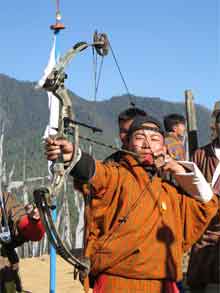 South
Asia related culture in Scandinavia
South
Asia related culture in Scandinavia
•
Bhutan exhibition in Stockholm extended into the Spring 2007
The
exhibition about the Buddhist Kingdom of Bhutan at the Museum of Ethnography
in Stockholm has been extended to be shown also during the
Spring 2007. The exhibition is organised in collaboration with the Swedish
Bhutan Society. It is titled
”Bhutan – borgarnas och klostrens rike i Himalaya”,
and consists of photos, textiles, costumes and antiquities from
private and public Swedish collections. Håkan Wahlquist,
Curator for the Asian items at the museum, recently visited Bhutan
in order to prepare for the exhibition (see his photo to the
right). The exhibition was formally inauguarted by the Bhutanese
Ambassador to Sweden (stationed in Switzerland), H.E. Mr Sonam
T. Rabgye, on Friday 25 August 2006. Venue: Etnografiska Museet,
Djurgårdsbrunnsvägen
34, Stockholm. More
information.
• More information about South Asia related
culture in Scandinavia
See SASNET’s page, http://www.sasnet.lu.se/culture.html
New and updated items on SASNET web site
• Swedish departments where research
on South Asia is going on:
Constantly added to the list of research environments at Swedish
universities, presented by SASNET. The full list now includes 203 departments,
with detailed descriptions of the South Asia related research and education
taking place! Go
to http://www.sasnet.lu.se/environment.html
ƒ East Asia Science & Technology Programme; European Institute of Japanese Studies (EIJS), Stockholm School of Economics
ƒ Church and Mission studies, Faculty of Theology, Uppsala University
Best regards,
Staffan Lindberg Lars Eklund
SASNET/ Swedish South Asian Studies Network
SASNET is a national network
for research, education, and information about South Asia, based at Lund
University. The aim is to encourage and promote an open and dynamic networking
process, in which Swedish researchers co-operate with researchers in South
Asia and globally.
The network is open to all sciences. Priority is given to co-operation
between disciplines and across faculties, as well as institutions in the
Nordic countries and in South Asia. The basic idea is that South Asian
studies will be most fruitfully pursued in co-operation between researchers,
working in different institutions with a solid base in their mother disciplines.
The network is financed by Sida (Swedish
International Development Cooperation Agency) and by Lund
University.
Postal address: SASNET – Swedish South Asian Studies Network,
Scheelevägen 15 D, SE-223 70 Lund, Sweden
Visiting address: Ideon Research Park, House Alfa 1 (first floor,
room no. 2040), in the premises of the Centre for East and South East
Asian Studies at Lund University (ACE).
Phone: + 46 46 222 73 40
Fax: + 46 46 222 30 41
E-mail: sasnet@sasnet.lu.se
Web site:
http://www.sasnet.lu.se
Staff: Staffan
Lindberg, director/coordinator & Lars
Eklund, webmaster/deputy director
SASNET - Swedish South Asian Studies Network/Lund
University
Address: Scheelevägen 15 D, SE-223 70 Lund, Sweden
Phone: +46 46 222 73 40
Webmaster: Lars Eklund
Last updated
2011-04-29
